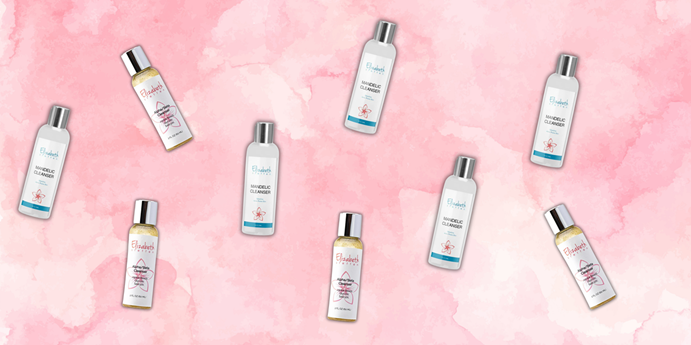
A Comprehensive Guide to the Different Acids in Skincare: Benefits and Uses

What are Acids in Skincare?
Acids in skincare play a crucial role in cleansing and exfoliating the skin. These powerful ingredients work by breaking down the bonds between dead skin cells, allowing them to be easily removed. This process not only cleanses the skin but also promotes cell turnover, revealing a more fresh and smooth complexion. Whether you’re dealing with dullness, uneven texture, or clogged pores, incorporating acids into your skincare routine can significantly enhance your skin's clarity and radiance.
Acids are versatile ingredients that can be found in a wide range of cosmetic products, including facial cleansers, toners, moisturizers, and serums. Each product type serves a different purpose in your skincare routine, from cleansing and toning to hydrating and treating specific skin concerns. For example, a cleanser with salicylic acid can help combat acne by deeply cleaning the pores, while a serum with hyaluronic acid can provide intense hydration. Incorporating these products into your daily routine can help you maintain healthy, glowing skin.
Types of Acids in Skincare
Alpha Hydroxy Acids (AHAs)
AHAs, or alpha hydroxy acids, are a group of natural acids commonly found in foods like glycolic acid from sugar cane, or lactic acid from milk. These water-soluble acids primarily work on the skin’s surface, making them particularly effective for addressing issues like fine lines, uneven texture, and dullness. By gently exfoliating the outermost layer of the skin, AHAs help to improve skin tone, diminish the appearance of acne scars, and stimulate collagen production, leading to a smoother, more youthful complexion.

Beta Hydroxy Acids (BHAs)
BHAs, or beta hydroxy acids, are a group of synthetic acids, with salicylic acid being the most well-known. These acids are able to penetrate deeply into clogged pores, making them particularly effective for treating acne. By exfoliating inside the pores, BHAs help to clear out impurities and reduce the occurrence of breakouts. Additionally, their anti-inflammatory properties make them beneficial for calming redness and swelling, especially in individuals with rosacea-prone skin. This makes BHAs a versatile choice for managing both acne and inflammation.

Benefits and Uses of Acids in Skincare
AHAs and BHAs are highly effective in enhancing skin tone, reducing the appearance of acne scars, and boosting collagen production, which helps to firm and plump the skin. Additionally, they play a significant role in diminishing fine lines and wrinkles, improving overall skin texture, and delivering antioxidant benefits that protect against environmental damage. These versatile ingredients can address a range of skin concerns, from acne and hyperpigmentation to dry skin, making them a valuable component in many skincare routines for achieving a healthier, more radiant complexion.

How to Use Acids in Skincare
Always patch test a new acid product on a small area of skin before applying it to your face to ensure you don’t experience any adverse reactions. Begin with a low concentration and gradually increase as your skin builds tolerance to avoid irritation. It’s important to use acids in moderation, as over-exfoliating can lead to skin sensitivity and damage. By introducing acids slowly and using them appropriately, you can achieve the benefits while maintaining healthy, balanced skin.

Precautions and Preparations for Using Acids
Always use sunscreen when incorporating acids into your skincare routine, as they can increase your skin’s sensitivity to the sun, making it more prone to sunburn and damage. Exercise caution when applying acids to sensitive skin, as they may cause irritation or discomfort. Additionally, avoid using multiple acids simultaneously, as this can amplify the risk of irritation and compromise your skin’s barrier. By taking these precautions, you can safely benefit from the exfoliating properties of acids while protecting and nurturing your skin.

Choosing the Right Acid for Your Skin Type
Salicylic acid is a powerhouse ingredient in skincare, renowned for its effectiveness in treating acne. As a beta hydroxy acid, it penetrates deeply into the pores to exfoliate and dissolve the buildup of dead skin cells and sebum that can lead to breakouts. Its anti-inflammatory properties help to reduce redness and swelling, making it a great choice for calming inflamed acne. Additionally, salicylic acid helps to unclog pores and prevent future acne flare-ups by keeping the skin clear of impurities. Regular use can lead to radiant skin, making salicylic acid a staple in many acne-fighting skincare routines.
Hyaluronic acid is a highly valued ingredient in skincare for its exceptional hydrating properties. This powerful humectant attracts and retains moisture, helping to keep the skin plump and hydrated. Hyaluronic acid can hold up to 1,000 times its weight in water, which makes it incredibly effective at maintaining skin's moisture balance and improving elasticity. Its lightweight texture makes it suitable for all skin types, including oily and sensitive skin. Regular use of hyaluronic acid can help reduce the appearance of fine lines and wrinkles, giving the skin a smoother, more youthful appearance. By boosting hydration levels, supports a healthy skin barrier and enhances overall skin texture.
Glycolic acid is a prominent AHA known for its powerful exfoliating effects. Derived from sugar cane, it penetrates the skin's surface to gently dissolve the bonds between dead skin cells, promoting their removal and revealing a fresher, more radiant complexion. Glycolic acid helps to improve skin texture, reduce the appearance of fine lines and wrinkles, and fade dark spots and hyperpigmentation. Its small molecular size allows it to effectively reach deeper layers of the skin, stimulating collagen production and enhancing overall skin elasticity. Regular use of glycolic acid can lead to smoother, brighter skin and a more even skin tone, making it a popular choice in both daily skincare and professional treatments.

Mandelic acid is a gentle AHA derived from bitter almonds, known for its mild exfoliating properties. Its larger molecular size compared to other AHAs means it exfoliates the skin more slowly and evenly, making it an excellent choice for those with sensitive or dry skin. Mandelic acid helps to reduce the appearance of fine lines, and address uneven skin tone and hyperpigmentation. Additionally, it has antimicrobial properties, making it beneficial for managing acne and reducing inflammation. Regular use of mandelic acid can lead to a smoother, more radiant complexion without the irritation often associated with stronger exfoliants.
Lactic acid is a gentle AHA derived from milk and is widely used in skincare for its exfoliating and hydrating benefits. It works by dissolving the bonds between dead skin cells, promoting their removal and revealing a fresher, more radiant complexion. Lactic acid is known for its ability to improve skin texture and tone while also providing significant hydration, making it ideal for dry and sensitive skin types. Its exfoliating action helps to smooth fine lines and reduce the appearance of dark spots and uneven pigmentation. Additionally, lactic acid enhances the skin's natural barrier function, supporting overall skin health and moisture retention.
At-Home vs. Professional Strength Acids
At-home peels typically contain about 10% or less AHA or BHA, offering a milder exfoliation suitable for regular use. In contrast, professional-grade peels can contain up to 70% AHA or BHA, providing a more intense treatment with the potential for more dramatic results. While these higher concentrations can effectively address deeper skin concerns and produce significant improvements in skin texture and tone, they also come with a higher risk of irritation and sensitivity. It’s essential to approach professional-strength peels with caution and ideally under the guidance of a skincare professional to ensure they are used safely and effectively.
Common Mistakes to Avoid When Using Acids in Skincare
Using multiple acids simultaneously can significantly heighten the risk of irritation, as combining different exfoliating agents may overwhelm the skin. Failing to patch test a new acid product can also result in unexpected irritation or allergic reactions, as individual skin sensitivities vary. Additionally, neglecting to apply sunscreen while using acids increases the risk of sun damage, as acids can make the skin more susceptible to UV rays. To maintain skin health and safety, it’s crucial to introduce acids gradually, perform patch tests, and consistently use sunscreen.




